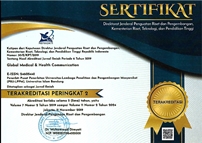Indoxyl Sulfate Levels and Its Relation with Executive Function in Routine Hemodialysis Patients
Abstract
Keywords
Full Text:
PDFReferences
Xie Z, Tong S, Chu X, Feng T, Geng M. Chronic kidney disease and cognitive impairment: the kidney-brain axis. Kidney Dis (Basel). 2022;8(4):275–85.
Sánchez-Fernández MDM, Reyes Del Paso GA, Gil-Cunquero JM, Fernández-Serrano MJ. Executive function in end-stage renal disease: acute effects of hemodialysis and associations with clinical factors. PLoS One. 2018;13(9):e0203424.
Lano G, Burtey S, Sallée M. Review indoxyl sulfate, a uremic endotheliotoxin. Toxins (Basel). 2020;12(4):229.
Nigam SK, Wu W, Bush KT, Hoenig MP, Blantz RC, Bhatnagar V. Handling of drugs, metabolites, and uremic toxins by kidney proximal tubule drug transporters. Clin J Am Soc Nephrol. 2015;10(11):2039–49.
Jansen J, Fedecostante M, Wilmer MJ, Peters JG, Kreuser UM, van den Broek PH, et al. Bioengineered kidney tubules effificiently excrete uremic toxins. Sci Rep. 2016;6:26715.
Sirich TL, Funk BA, Plummer NS, Hostetter TH, Meyer TW. Prominent accumulation in hemodialysis patients of solutes normally cleared by tubular secretion. J Am Soc Nephrol. 2014;25(3):615–22.
Kuo YT, Li CY, Sung JM, Chang CC, Wang JD, Sun CY, et al. Risk of dementia in patients with end-stage renal disease under maintenance dialysis—a nationwide population-based study with consideration of competing risk of mortality. Alzheimers Res Ther. 2019;11(1):31.
Vanholder R, Pletinck A, Schepers E, Glorieux G. Biochemical and clinical impact of organic uremic retention solutes: a comprehensive update. Toxins (Basel). 2018;10(1):33.
Kroenke K, Spitzer RL, Williams JB. The PHQ-9: validity of a brief depression severity measure. J Gen Intern Med. 2001;16(9):606–13.
Levey AS, Eckardt KU, Tsukamoto Y, Levin A, Coresh J, Rossert J. Definition and classification of chronic kidney disease: a position statement from kidney disease: improving global outcomes (KDIGO). Kidney Int. 2005;67(6):2089–100.
Bronas UG, Puzantian H, Hannan M. Cognitive impairment in chronic kidney disease: vascular milieu and the potential therapeutic role of exercise. Biomed Res Int. 2017;2017:2726369.
Foster R, Walker S, Brar R, Hiebert B, Komenda P, Rigatto C, et al. Cognitive impairment in advanced chronic kidney disease: the Canadian frailty observation and interventions trial. Am J Nephrol. 2016;44(6):473–80.
Zhang CY, He FF, Su H, Zhang C, Meng XF. Association between chronic kidney disease and Alzheimer’s disease: an update. Metab Brain Dis. 2020;35(6):883–94.
Szerlip HM, Edwards ML, Williams BJ, Johnson LA, Vintimilla RM, O'Bryant SE. Association between cognitive impairment and chronic kidney disease in Mexican Americans. J Am Geriatr Soc. 2015;63(10):2023–8.
Niwa T. Indoxyl sulfate is a nephro-vascular toxin. J Ren Nutr. 2010;20(Suppl 5):S2–6.
Yeh YC, Huang MF, Liang SS, Hwang SJ, Tsai JC, Liu TL, et al. Indoxyl sulfate, not p-cresyl sulfate, is associated with cognitive impairment in early-stage chronic kidney disease. Neurotoxicology. 2016;53:148–52.
Diamond A. Executive functions. Annu Rev Psychol. 2013;64:135–68.
Kurella Tamura M, Vittinghoff E, Hsu CY, Tam K, Seliger SL, Sozio S, et al.; CRIC Study Investigators. Loss of executive function after dialysis initiation in adults with chronic kidney disease. Kidney Int. 2017;91(4):948-953.
Murthy VS, Shukla VS. A study of executive function in patients with chronic kidney disease before and after a single session of hemodialysis. J Neurosci Rural Pract. 2020 Apr;11(2):250-255.
Niwa T. Removal of protein-bound uraemic toxins by haemodialysis. Blood Purif. 2013;35(Suppl 2):20–5.
Eloot S, Schneditz D, Cornelis T, Van Biesen W, Glorieux G, Dhondt A, et al. Protein-bound uremic toxin profiling as a tool to optimize hemodialysis. PLoS One. 2016;11(1):e0147159.
Niwa T. Indoxyl sulfate, a tryptophan metabolite, induces nephro-vascular toxicity. Biotechnol Biotechnol Equip. 2012;26(Suppl 1):129–33.
Wu IW, Hsu KH, Lee CC, Sun CY, Hsu HJ, Tsai CJ, et al. p-cresyl sulphate and indoxyl sulphate predict progression of chronic kidney disease. ol Dial Transplant. 2011;26(3):938–47.
Lin CJ, Liu HL, Pan CF, Chuang CK, Jayakumar T, Wang TJ, et al. Indoxyl sulfate predicts cardiovascular disease and renal function deterioration in advanced chronic
Hsu CC, Lu YC, Chiu CA, Yu TH, Hung WC, Wang CP, et al. Levels of indoxyl sulfate are associated with severity of coronary atherosclerosis. Clin Invest Med. 2013;36(1):E42–9.
DOI: https://doi.org/10.29313/gmhc.v11i2.10964
pISSN 2301-9123 | eISSN 2460-5441
Visitor since 19 October 2016:
Global Medical and Health Communication is licensed under a Creative Commons Attribution-NonCommercial-ShareAlike 4.0 International License.































.png)
_(1).png)
_(1).jpg)
